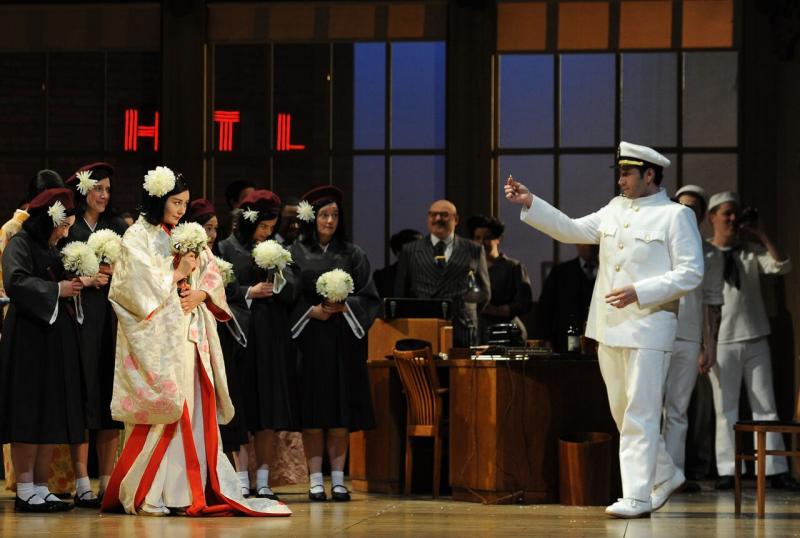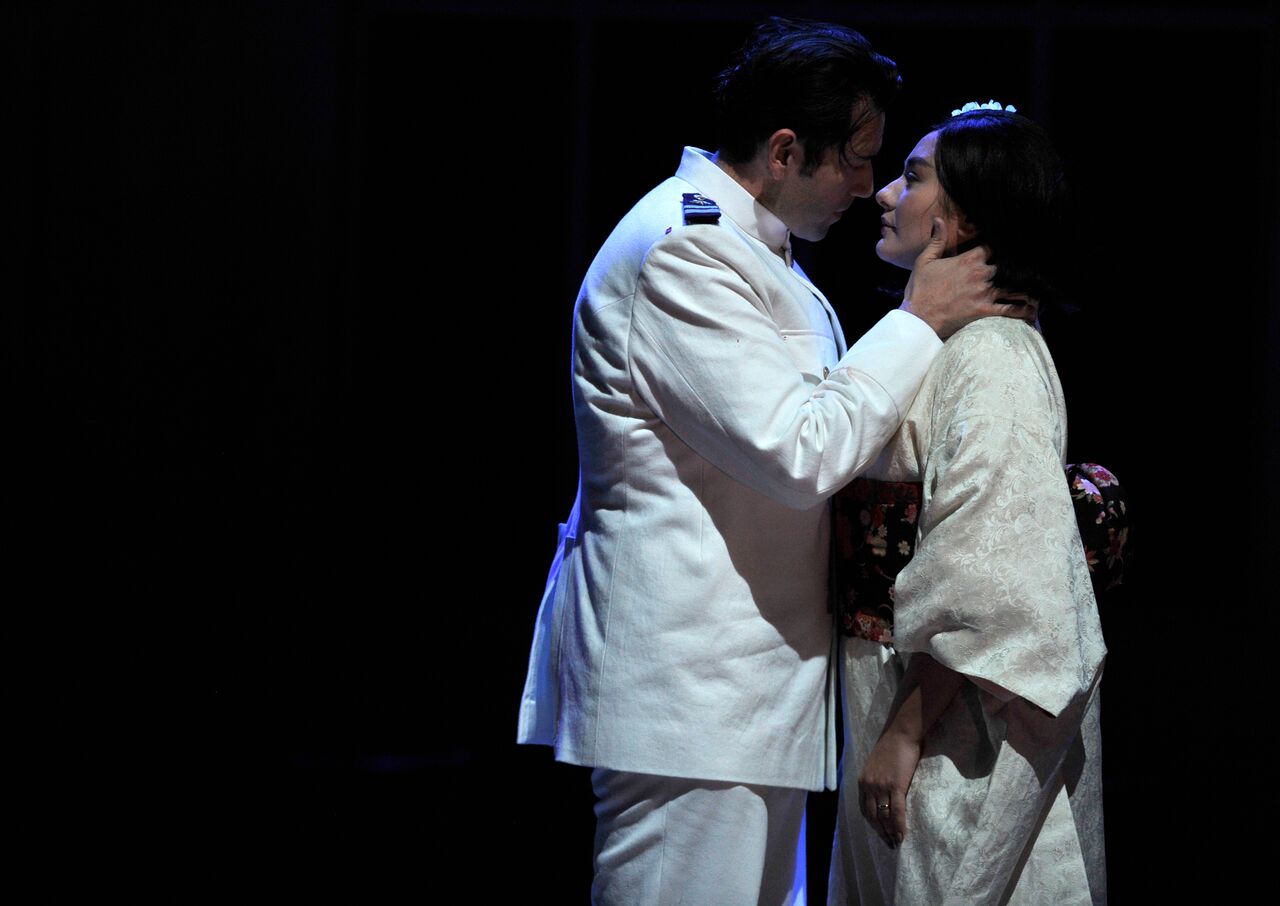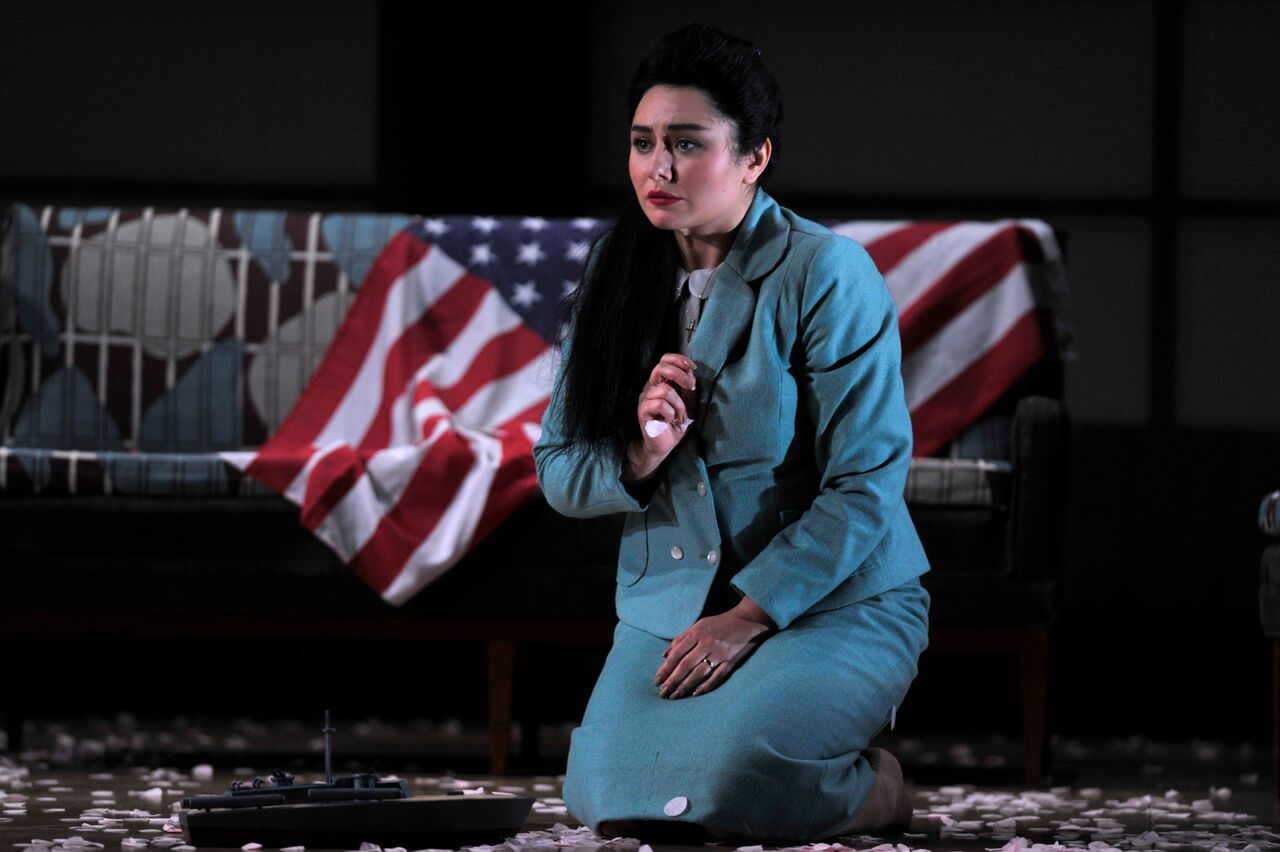Madama Butterfly, Glyndebourne review - perverse staging, outstanding cast | reviews, news & interviews
Madama Butterfly, Glyndebourne review - perverse staging, outstanding cast
Madama Butterfly, Glyndebourne review - perverse staging, outstanding cast
Puccinian pathos takes on tragic colouring thanks to a gifted soprano from Moldova

Puccini’s heroines and the rough treatment he hands out to them have come in for plenty of opprobrium over the years.
The production itself, in Nicky Shaw’s designs, seems not to have changed much. There remains the modish and apparently pointless update to the 1950s (in Nagasaki, for heaven’s sake!). There remains the self-defeating relocation of the first act to the agent Goro’s office, which makes nonsense of so many details in the scenario that one hardly knows where to begin listing them. There remain all kinds of lapel-clutching double underlinings of the otherwise (not so) easily missed anti-American subtext of the libretto, which both insult the audience’s intelligence and successfully undermine the real magic of Pinkerton’s (admittedly very temporary) passion for his little Japanese geisha (Olga Busoloc and Joshua Guerrero pictured below in the Act One duet).  But this is where the superb Moldovan soprano Olga Busuioc comes in and, with the help of an excellent if not very assertive young American tenor, Joshua Guerrero, suddenly brings direction and shape to the Miskimmon “concept”. My wife asked, rhetorically: is Cio-Cio San a tragic figure? And too often the answer is: no, she’s just a passive #MeToo victim. But Busuioc shows, in a performance of sustained dramatic intensity and vocal brilliance, that “povera Butterfly” is a figure who can grow in stature as she sheds her oriental passivity, is abandoned by friends and family and ridiculed by the Japanese agent (pimp?) whose sole aim was to sell her to the highest bidder.
But this is where the superb Moldovan soprano Olga Busuioc comes in and, with the help of an excellent if not very assertive young American tenor, Joshua Guerrero, suddenly brings direction and shape to the Miskimmon “concept”. My wife asked, rhetorically: is Cio-Cio San a tragic figure? And too often the answer is: no, she’s just a passive #MeToo victim. But Busuioc shows, in a performance of sustained dramatic intensity and vocal brilliance, that “povera Butterfly” is a figure who can grow in stature as she sheds her oriental passivity, is abandoned by friends and family and ridiculed by the Japanese agent (pimp?) whose sole aim was to sell her to the highest bidder.
Here the fifties revamp of her little casetta in the second act does begin to make some kind of sense. The absurd sub-American G-plan drawing room and the poor girl’s smart western suit are a cruel - perhaps crude - image of her escape from - well, from what exactly in post-war Nagasaki, but let’s not quibble too much. And when Busuioc delivers her “Un bel di,” so to speak, to the audience rather than to her maid, Suzuki, she truly seems to be looking out and beyond, to something longed for but alas misunderstood and that will, in the end, destroy her. Not a bad definition of tragedy, perhaps.  Busuioc (pictured above) is also equal to the draining and drawn-out pathos of the final scene, which few sopranos can make even bearable, let alone plausible. She is marvellously supported, it must be said. Elizabeth DeShong, a mezzo who has sung Cenerentola, is sheer luxury as Suzuki, and Michael Sumuel is a fine, dark-voiced Sharpless who brings just the right blend of humanity and bewilderment to a role that specifically limits the blanket racial stereotypes built into this scenario. Carlo Bosi is a suitably slimy Goro singing, nevertheless, a strong, clear tenor, and there is a string of crisp vignettes from Simon Mechlinski (Yamadori), Oleg Budaratskiy (Bonze), and others too numerous to list, as well as from the excellent Glyndebourne Chorus as a whole
Busuioc (pictured above) is also equal to the draining and drawn-out pathos of the final scene, which few sopranos can make even bearable, let alone plausible. She is marvellously supported, it must be said. Elizabeth DeShong, a mezzo who has sung Cenerentola, is sheer luxury as Suzuki, and Michael Sumuel is a fine, dark-voiced Sharpless who brings just the right blend of humanity and bewilderment to a role that specifically limits the blanket racial stereotypes built into this scenario. Carlo Bosi is a suitably slimy Goro singing, nevertheless, a strong, clear tenor, and there is a string of crisp vignettes from Simon Mechlinski (Yamadori), Oleg Budaratskiy (Bonze), and others too numerous to list, as well as from the excellent Glyndebourne Chorus as a whole
Whatever you think of Puccini as a tragedian, his mastery of his craft is beyond question. You can listen to the orchestration of Madama Butterfly and marvel at its precision and delicacy. Omer Meir Wellber draws consistently refined, energetic playing from the London Philharmonic Orchestra, needing only, perhaps, to attend a shade more, now and then, to his singers. Which brings me back to the staging: annoying and perverse in many respects, but with something at its core that an exceptional cast proves able to bring out.
- Further performances of Madama Butterfly until 18 July
- More opera reviews on theartsdesk
Add comment
The future of Arts Journalism
You can stop theartsdesk.com closing!
We urgently need financing to survive. Our fundraising drive has thus far raised £49,000 but we need to reach £100,000 or we will be forced to close. Please contribute here: https://gofund.me/c3f6033d
And if you can forward this information to anyone who might assist, we’d be grateful.

Subscribe to theartsdesk.com
Thank you for continuing to read our work on theartsdesk.com. For unlimited access to every article in its entirety, including our archive of more than 15,000 pieces, we're asking for £5 per month or £40 per year. We feel it's a very good deal, and hope you do too.
To take a subscription now simply click here.
And if you're looking for that extra gift for a friend or family member, why not treat them to a theartsdesk.com gift subscription?
more Opera
 Orpheus and Eurydice, Opera Queensland/SCO, Edinburgh International Festival 2025 review - dazzling, but distracting
Eye-popping acrobatics don’t always assist in Gluck’s quest for operatic truth
Orpheus and Eurydice, Opera Queensland/SCO, Edinburgh International Festival 2025 review - dazzling, but distracting
Eye-popping acrobatics don’t always assist in Gluck’s quest for operatic truth
 MARS, Irish National Opera review - silly space oddity with fun stretches
Cast, orchestra and production give Jennifer Walshe’s bold collage their all
MARS, Irish National Opera review - silly space oddity with fun stretches
Cast, orchestra and production give Jennifer Walshe’s bold collage their all
 Káťa Kabanová, Glyndebourne review - emotional concentration in a salle modulable
Janáček superbly done through or in spite of the symbolism
Káťa Kabanová, Glyndebourne review - emotional concentration in a salle modulable
Janáček superbly done through or in spite of the symbolism
 Buxton International Festival 2025 review - a lavish offering of smaller-scale work
Allison Cook stands out in a fascinating integrated double bill of Bernstein and Poulenc
Buxton International Festival 2025 review - a lavish offering of smaller-scale work
Allison Cook stands out in a fascinating integrated double bill of Bernstein and Poulenc
 Tosca, Clonter Opera review - beauty and integrity in miniature
Happy surprises and a convincing interpretation of Puccini for today
Tosca, Clonter Opera review - beauty and integrity in miniature
Happy surprises and a convincing interpretation of Puccini for today
 Hamlet, Buxton International Festival review - how to re-imagine re-imagined Shakespeare
Music comes first in very 19th century, very Romantic, very French operatic creation
Hamlet, Buxton International Festival review - how to re-imagine re-imagined Shakespeare
Music comes first in very 19th century, very Romantic, very French operatic creation
 Falstaff, Glyndebourne review - knockabout and nostalgia in postwar Windsor
A fat knight to remember, and snappy stagecraft, overcome some tedious waits
Falstaff, Glyndebourne review - knockabout and nostalgia in postwar Windsor
A fat knight to remember, and snappy stagecraft, overcome some tedious waits
 Salome, LSO, Pappano, Barbican review - a partnership in a million
Asmik Grigorian is vocal perfection in league with a great conductor and orchestra
Salome, LSO, Pappano, Barbican review - a partnership in a million
Asmik Grigorian is vocal perfection in league with a great conductor and orchestra
 Semele, Royal Opera review - unholy smoke
Style comes and goes in a justifiably dark treatment of Handelian myth
Semele, Royal Opera review - unholy smoke
Style comes and goes in a justifiably dark treatment of Handelian myth
 Le nozze di Figaro, Glyndebourne review - perceptive humanity in period setting
Mostly glorious cast, sharp ideas, fussy conducting
Le nozze di Figaro, Glyndebourne review - perceptive humanity in period setting
Mostly glorious cast, sharp ideas, fussy conducting
 Fidelio, Garsington Opera review - a battle of sunshine and shadows
Intimacy yields to spectacle as Beethoven's light of freedom triumphs
Fidelio, Garsington Opera review - a battle of sunshine and shadows
Intimacy yields to spectacle as Beethoven's light of freedom triumphs
 Dangerous Matter, RNCM, Manchester review - opera meets science in an 18th century tale
Big doses of history and didaction are injected into 50 minutes of music theatre
Dangerous Matter, RNCM, Manchester review - opera meets science in an 18th century tale
Big doses of history and didaction are injected into 50 minutes of music theatre

Comments
Have just come from a